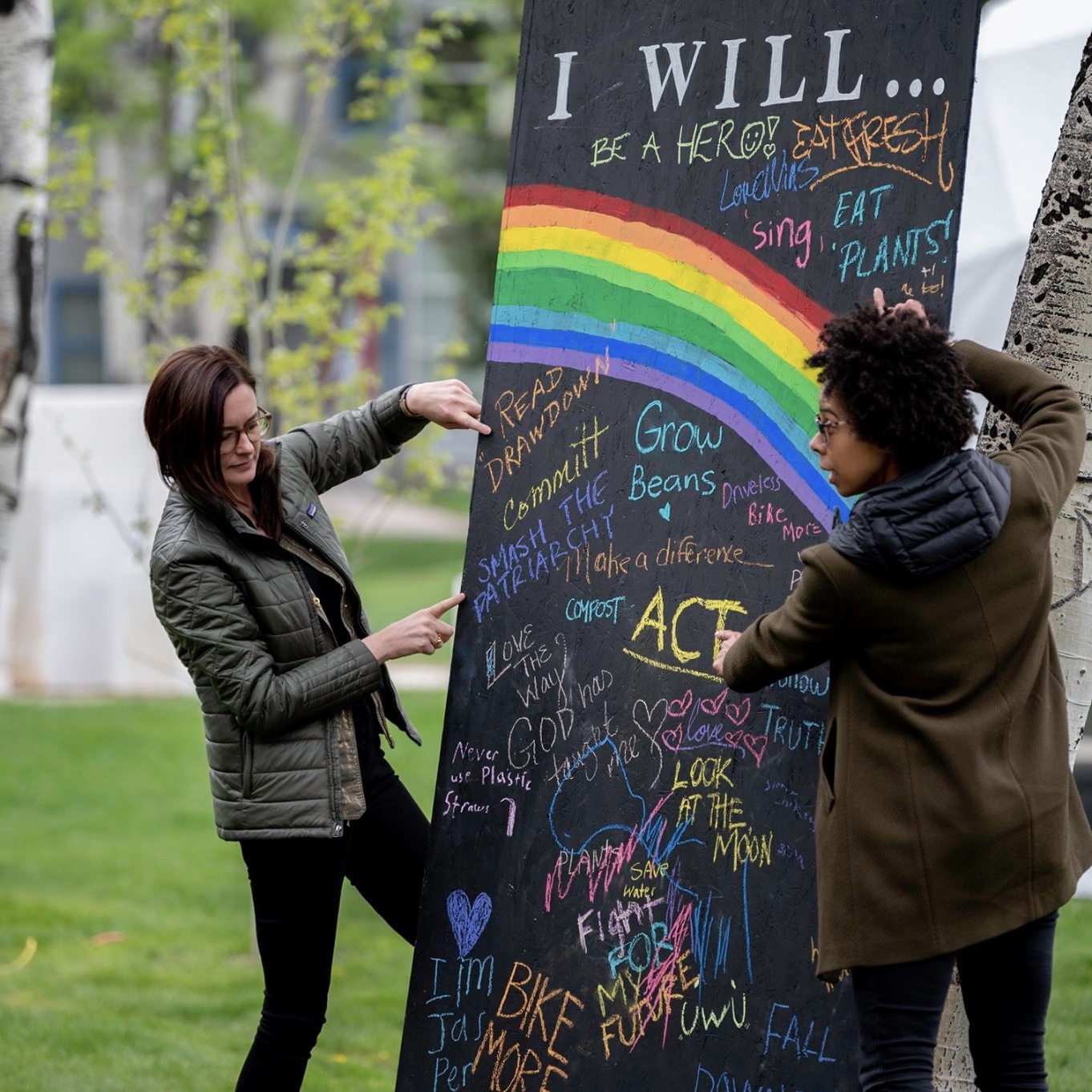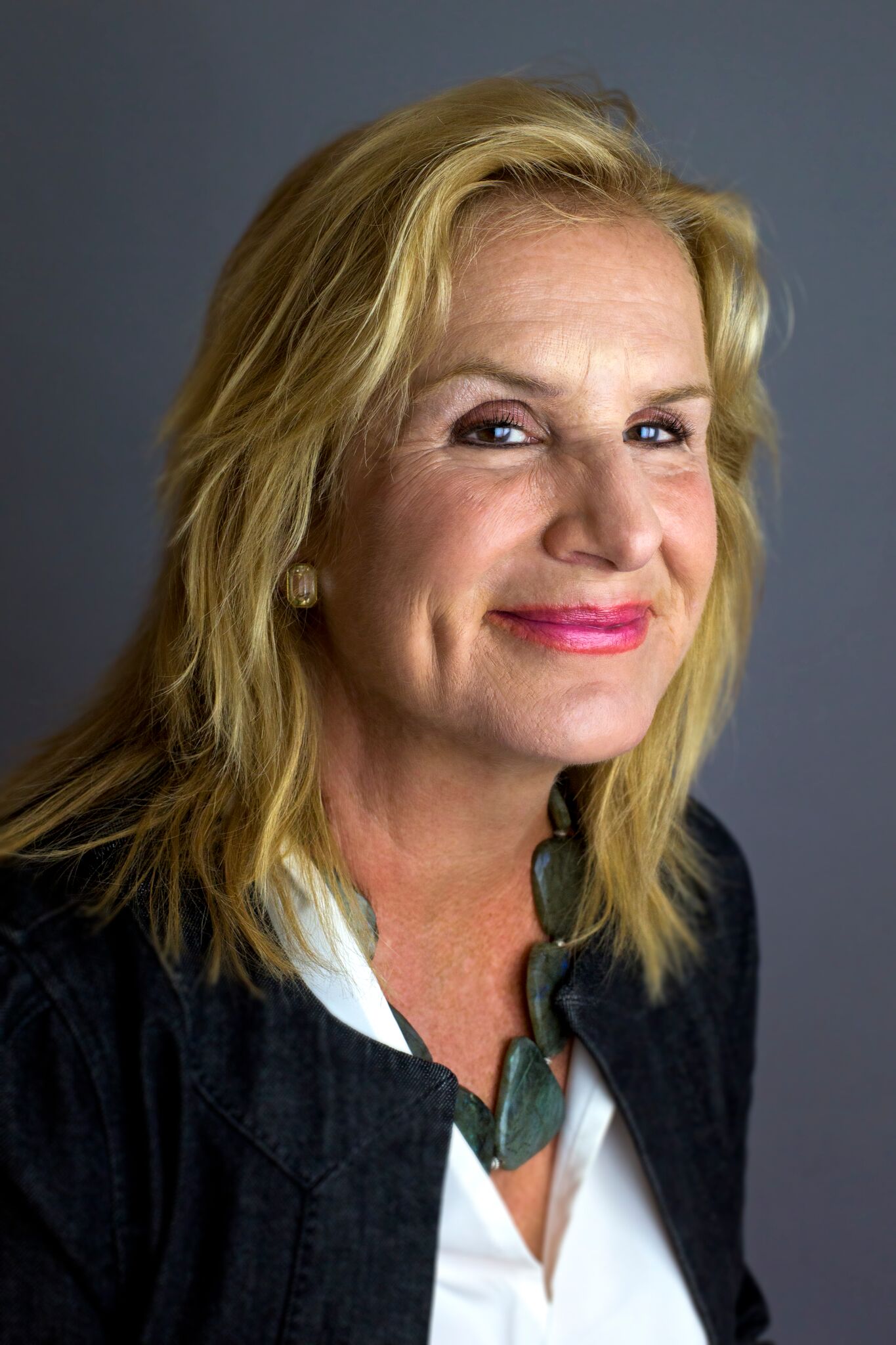
An Adrienne Rich poem inspired the title for the nonprofit, All We Can Save Project.
“My heart is moved by all I cannot save: so much has been destroyed/ I have to cast my lot with those/ who age after age, perversely,/ with no extraordinary power,/ reconstitute the world.”
“That is my drumbeat. To have truth, courage and solutions, the trifecta,” says Dr. Ayana Elizabeth Johnson, marine biologist, policy expert and founder of Urban Ocean Lab, who also co-founded All We Can Save with Dr. Katherine Wilkinson, author and editor-in-chief of Project Drawdown.
Johnson says she and Wilkinson came up with the idea for a non-profit, curriculum, collaboration circles and a groundbreaking collection of essays, poems and artwork on a hike in Colorado during a break from a conference in 2019.
“We had this idea because we were frustrated by who was in charge of the climate conversation,” Johnson says. “So much super important work was not getting support, respect or attention and the concept was born out of that frustration,” says Johnson, who also is founder and CEO of Ocean Collective and co-creator of the podcast, “How To Save A Planet.”
Co-founder Wilkinson is the author of bestsellers Drawdown and Between God & Green. Her TED talk on climate and gender equality has earned 1.8 million views. In 2019, Time magazine named her one of 15 “women who will save the world.”
“We need a whole new set of leaders and books is one of the traditional paths to uplift the voices out there,” says Johnson, explaining the genesis of the new anthology, All We Can Save: Truth, Courage and Solutions For The Climate Crisis.
The collectionfeatures the work of a diverse and inclusive group of female scientists, journalists, farmers, lawyers, teachers, activists, innovators, designers and artists aiming “to advance a more representative, nuanced and solution-oriented public conversation on the climate crisis.”
According to All We Can Save, the gendered mission is based on an urgent need.
“We need an up swelling of transformational climate leadership that is more characteristically feminine and more faithfully feminist, rooted in compassion, connection, creativity, and collaboration. Many of today’s most compelling climate leaders are women, specifically women of color, and this community of transformational leadership is undoubtedly on the rise. But not nearly fast enough.”
The site states, “With more intentional community building, generous funding, and focused engagement and support for women climate leaders, we can unleash potential and accelerate the success of the climate movement.”
Johnson and Wilkinson moved quickly from that hike in the spring of 2019 to the recent launch of education and engagement grounded in the anthology, All We Can Save, featuring 41 essays, 17 poems and artwork.
All We Can Save Circles, recently launched and now numbering more than 250 in the U.S, are small groups “committed to reading the book collectively and engaging in directed dialogue that seeds action, using the resources created. Additional curriculum materials and media will be developed to enable the book’s use as a course text for various age groups.” Each week for 10 weeks, questions for dialogue and resources will be distributed through the All We Can Save newsletter.
“More than a problem of bias, suppressing the climate leadership and participation of women and girls—half the world’s brainpower and change-making might—sets us up for failure,” according to the All We Can Save site.
The book has already been adapted in university courses, Johnson says. “So many people have been eager for a book to tell it like it is,” Johnson says. “It does not wallow or sugar coat.”
With a goal of “broader community building for women in climate, including both high-touch and distributed programs, The Project will foster connection, care, and collaboration for change among women in climate through virtual and in-person programs,” according to the site materials.
“We are making sure we are listening to a broader spectrum of leaders. Forty percent of the authors are women of color,” Johnson says.
“Beginning in 2021, The All We Can Save Project will provide monetary and other meaningful support for the evolution and ideas of women leading on climate, foster connected leadership and community among awardees, and help leap-frog barriers women face in the climate movement.”
“The timeline was pretty insane,” Johnson says.
After securing a book contract and soliciting the contributors, the book needed to be edited and finalized in a few months. It was hectic, but it is completed and already making a difference in amplifying the voices of female leaders in the environment, she says.
Research shows that women tend to care more about climate change and act on those feelings. Women also tend to avoid taking on outsized risk or imposing it on others. This approach carries into politics and policymaking. Female legislators more strongly support environmental laws—and stricter laws at that. When women participate equally with men, climate policy interventions are more effective.
Johnson, born and raised in Brooklyn, also co-created The Blue New Deal, a roadmap to include the ocean in climate policy. She served as director of the Waitt Institute and co-founded the Blue Halo Initiative and was a leader in the March For Science. Elle magazine named her one of “27 women leading the change to protect our environment.” Outside magazine called her “the most influential marine biologist of our time.”
Her interest in the environment was sparked early. When she was five years old, Johnson says, she was on vacation with her family in Key West, Florida, and saw a coral reef for the first time.
“I was absolutely enamored,” Johnson says of the view from the glass bottom boat.
But like most children, she had other dreams, and hers were of being a modern dancer or a jazz singer.
“Marine biologist is a common dream job,” says Johnson, who earned her BA from Harvard University in environmental science and public policy and her PhD from Scripps institution of Oceanography in marine biology.
“For me it was the sense that everything I cared about was all connected, that science and policy was this crazy puzzle. The science alone would not have kept my attention,” she says. She needed to “figure this out and move beyond the glass bottom boat.”
Here are 8 takeaways from All We Can Save essays and their authors:
- “Though indigenous peoples comprise only about 5% of the global population, our lands hold approximately 80% of the world’s biodiversity, and represent an estimated 40-50% of the remaining protected places in the world.” Sherri Mitchell, “Indigenous Prophecy and Mother Earth.”
- “The last time there was this much carbon dioxide in the atmosphere, humans didn’t exist.”—Naomi Klein, “On Fire.”
- “We’re now getting less than 25% of our electricity from coal in the United States (down from 50% a decade ago), and we’re on track to meet the call of the world’s climate scientists to phase out coal in the developed world by 2030.”— Mary Anne Hitt, “Beyond Coal.”
- “Black farmers have lost 80% of their farmland over the last century due to discrimination, especially from the United States Department of Agriculture. This amounts to around 30 million acres and hundreds of billions of dollars in lost wealth.”— Maggie Thomas, “The Politics of Policy.”
- “By 2060, the scientific consensus is that the sea will rise in Miami Beach somewhere between 14 and 34 inches above 1992 levels. By 2100, it could be 6 feet above those levels.”— Sarah Miller, “Heaven or High Water.”
- “It takes just 3.5% of a population getting active—voting, donating, taking to the stree”ts, talking to their neighbors—for a campaign to win.”—Varshini Prakash, “We Are Sunrise.”
- “A study by the NAACP found that black Americans are 75% more likely than whites to live in ‘fence-line’ communities, meaning next to commercial facilities whose noise, odor, traffic, and emissions directly affect the population.”— Cameron Russell, “Dear Fossil Fuel Executives and Financiers.”
- “16% percent of all premature deaths across the world are the result of exposure to air pollution—almost 9 million human beings annually. This is more than the number of people killed by tuberculosis, malaria, and AIDS combined.”— Gina McCarthy, “Public Service for Public Health.”
Dianne Dillon-Ridgley, environmentalist and human rights activist, has worked on issues of the environment and sustainability, gender and CSR, both domestically and internationally for 40 years and is on the board of directors of Take The Lead.
“For thousands and thousands of years women have rolled up their sleeves and cleaned whatever mess we face. Today, climate justice heroes are the mothers and midwives of the 21st century giving effort to heal our world, for we are the women who will change the world,” says Dillon-Ridgley, who has had appointments from three U.S. Presidents and served on over 23 U.S. government delegations.
Dillon-Ridgley adds, “Time after time in country after country, I have seen women stand up and speak up, fearless and fed up. That is the ‘energy’ that will demand we make the shift to a renewable economy, no more Flints, Katrinas, Standing Rocks or disposable people or communities.”

